Hexagramme 3 du Yi Jing - Trait 3
L'hexagramme : 3
Un hexagramme est une combinaison de six traits yin et yang.

3.3 (3 > 63) - THE KUN HEXAGRAM
The third line, divided, shows one following the deer without (the guidance of) the forester, and only finding himself in the midst of the forest. The superior man, acquainted with the secret risks, thinks it better to give up the chase. If he went forward, he would regret it.
Bing DeepL Google Yandex3.3 (3 > 63) - Resolving difficulties
Venturing alone into unfamiliar territory. One should seek a guide or turn back.
Bing DeepL Google Yandex3.3 (3 > 63) - Resolving difficulties
Venturing alone into unfamiliar territory. One should seek a guide or turn back.
Bing DeepL Google Yandex3.3 (3 > 63) - T’un, la difficulté initiale
T’un et tchun : A. 1. Bourgeon, pousse ; 2. Croissance, activité ; 3. Grandir, avancer. — B. Difficultés, arrêté dans son avancement, échec.
Lorsque le gibier poursuivi s’enfonce inopinément dans une forêt profonde, le sage aime mieux l’abandonner que de s’exposer au danger. S’il l’y poursuit, il aura lieu de s’en repentir.
Il sera réduit à l’extrémité.
3.3 (3 > 63) - Remédier aux difficultés
Partir seul en terrain inconnu. Il vaut mieux chercher un guide ou rebrousser chemin.
Bing DeepL Google Yandex3.3 (3 > 63) - Megoldás
Magányosan halad ismeretlen terepen. Vezetőt kell keresnie vagy visszafordulnia.
Bing DeepL Google YandexLes trigrammes
Les trigrammes sont des combinaisons de trois traits yin et yang. Dans l'hexagramme, les trois traits du dessous constituent le trigramme inférieur et représentent la situation intérieure. Les trois lignes du haut constituent le trigramme supérieur et représentent la situation extérieure.
trigSup

Trigramme inférieur : Le tonnerre Le feu


L'hexagramme nucléaire : 23.2.4 (23 > 64)
L'hexagramme nucléaire est l'association des deux trigrammes intérieurs (traits 2,3,4 et 3,4,5). Il représente la racine, ou l'origine de la situation.

23.2.4 (23 > 64) - THE PO HEXAGRAM
- 2. The second line, divided, shows one overthrowing the couch by injuring its frame. (The injury will go on to) the destruction of (all) firm correctness, and there will be evil.
- 4. The fourth line, divided, shows its subject having overthrown the couch, and (going to injure) the skin (of him who lies on it). There will be evil.
23.2.4 (23 > 64) - Preparing patches
One is bolstering an old piece of debris to send it to the front.
Bing DeepL Google Yandex23.2.4 (23 > 64) - Preparing patches
One is bolstering an old piece of debris to send it to the front.
Bing DeepL Google Yandex23.2.4 (23 > 64) - Poh, l’écroulement
Poh : opprimer, renverser, traiter durement.
-
2. [i]Id. (Poh)[i], renverser son lit en en brisant la forme ; ruine, issue destructive. C’est celui qui se perd lui-même en perdant ses auxiliaires ; un roi, ses ministres ; un grand, ses employés et amis. (Dicton.)
Il n’aura pas de compagnons.
C’est la ruine s’étendant, gagnant le haut. -
4. Renverser son lit en s’écorchant, en se nuisant à soi-même, destruction certaine, calamité proche.
Suite de la gradation, en renversant on se blesse
23.2.4 (23 > 64) - Préparer des rustines
On rafistole un vieux débris pour l'envoyer au front.
Bing DeepL Google Yandex23.2.4 (23 > 64) - Lepusztulás
- 2. Támasz, amire nem lehet számítani többé.
- 4. Nem akar elviselni többé.
Le dérivé (Fan Yao) : 63.3
Le même trait sur l'hexagramme après la mutation. Il représente ce qui peut être fait APRÈS pour corriger la situation décrite par ce trait, un peu comme un remède ou une solution.

63.3 (63 > 3) - THE KÎ 3Î HEXAGRAM.
The third line, undivided, (suggests the case of) Kao 3ung who attacked the Demon region, but was three years in subduing it. Small men should not be employed (in such enterprises).
Bing DeepL Google Yandex63.3 (63 > 3) - Rallying the troops
One uses one's strengths to solve a problem, it will be painful. The most competent will go first.
Bing DeepL Google Yandex63.3 (63 > 3) - Rallying the troops
One uses one's strengths to solve a problem, it will be painful. The most competent will go first.
Bing DeepL Google Yandex63.3 (63 > 3) - Tchi tzi, ce qui suit l’achèvement
Tchi-tzi : traversée achevée, achèvement, succès, moyen d’achever, compléter.
Expédition achevée. — Kao-tsong (empereur de la dynastie Shang ; régnait vers 1300 et resta cinquante-neuf ans sur le trône. Les démons dont il s’agit sont les aborigènes insoumis et déprédateurs) attaqua la région des démons et, en trois ans, acheva son triomphe. Un prince vulgaire n’eût pu le faire.
Il eut beaucoup de peine.
63.3 (63 > 3) - Sonner la charge
On emploie ses forces à résoudre un problème, cela sera pénible. Les plus compétents iront les premiers.
Bing DeepL Google Yandex63.3 (63 > 3) - Maximum
Keményen dolgozik hogy megoldjon egy problémát, ez gyötrelmes lesz. A legrátermettebbnek kell kezdenie.
Bing DeepL Google YandexLa jointure: 64.4
Le dérivé du réciproque. Il représente ce qui aurait pu être fait AVANT pour prévenir la situation décrite par ce trait, un peu comme un remède ou une solution.

64.4 (64 > 4) - THE WEI 3Î HEXAGRAM.
The fourth line, undivided, shows its subject by firm correctness obtaining good fortune, so that all occasion for repentance disappears. Let him stir himself up, as if he were invading the Demon region, where for three years rewards will come to him (and his troops) from the great kingdom.
Bing DeepL Google Yandex64.4 (64 > 4) - Getting back to one's supports
After having provided assistance to control the situation, one will be solicited again.
Bing DeepL Google Yandex64.4 (64 > 4) - Getting back to one's supports
After having provided assistance to control the situation, one will be solicited again.
Bing DeepL Google Yandex64.4 (64 > 4) - Wei tzi, ce qui précède l’achèvement.
Wei-tzi : traversée non achevée, oeuvre non achevée, succès interrompu, compromis ; chose non achevée, non menée à bonne fin.
Une fin heureuse, ne laissant aucun regret (telle est celle de Kao-tsong) ; se levant, il attaqua et vainquit le pays des démons, en trois ans. Il eut sa récompense dans son immense puissance et domaine.
La conclusion est heureuse quand le but est atteint, la volonté satisfaite.
64.4 (64 > 4) - Retrouver ses soutiens
Après avoir apporté son aide afin de maîtriser la situation, on sera sollicité à nouveau.
Bing DeepL Google Yandex64.4 (64 > 4) - Ingatagság
Miután segítséget nyújt a helyzet uralásában, újra meg fogják keresni.
Bing DeepL Google YandexLe réciproque : 4.4
L'hexagramme renversé. Il représente la situation opposée, et en tant que tel est essentiel pour la validation des commentaires.

4.4 (4 > 64) - THE MĂNG HEXAGRAM
The fourth line, divided, (shows its subject as if) bound in chains of ignorance. There will be occasion for regret.
Bing DeepL Google Yandex4.4 (4 > 64) - Questioning
If one learns alone, it is because they wanted it.
Bing DeepL Google Yandex4.4 (4 > 64) - Questioning
If one learns alone, it is because they wanted it.
Bing DeepL Google Yandex4.4 (4 > 64) - Meng, la stupidité juvénile
Meng : Intelligence non encore développée ; être non encore formé.
L’ignorance pauvre et abandonnée est chose funeste. L’abandon, l’isolement tient éloignée la possession de la vérité.
Bing DeepL Google YandexMutations

3.3 (3 > 63) - THE KUN HEXAGRAM
The third line, divided, shows one following the deer without (the guidance of) the forester, and only finding himself in the midst of the forest. The superior man, acquainted with the secret risks, thinks it better to give up the chase. If he went forward, he would regret it.
Bing DeepL Google Yandex3.3 (3 > 63) - Resolving difficulties
Venturing alone into unfamiliar territory. One should seek a guide or turn back.
Bing DeepL Google Yandex3.3 (3 > 63) - Resolving difficulties
Venturing alone into unfamiliar territory. One should seek a guide or turn back.
Bing DeepL Google Yandex3.3 (3 > 63) - T’un, la difficulté initiale
T’un et tchun : A. 1. Bourgeon, pousse ; 2. Croissance, activité ; 3. Grandir, avancer. — B. Difficultés, arrêté dans son avancement, échec.
Lorsque le gibier poursuivi s’enfonce inopinément dans une forêt profonde, le sage aime mieux l’abandonner que de s’exposer au danger. S’il l’y poursuit, il aura lieu de s’en repentir.
Il sera réduit à l’extrémité.
3.3 (3 > 63) - Remédier aux difficultés
Partir seul en terrain inconnu. Il vaut mieux chercher un guide ou rebrousser chemin.
Bing DeepL Google Yandex3.3 (3 > 63) - Megoldás
Magányosan halad ismeretlen terepen. Vezetőt kell keresnie vagy visszafordulnia.
Bing DeepL Google Yandex
3.1.3 (3 > 39) - THE KUN HEXAGRAM
- 1. The first line, undivided, shows the difficulty (its subject has) in advancing. It will be advantageous for him to abide correct and firm; advantageous (also) to be made a feudal ruler.
- 3. The third line, divided, shows one following the deer without (the guidance of) the forester, and only finding himself in the midst of the forest. The superior man, acquainted with the secret risks, thinks it better to give up the chase. If he went forward, he would regret it.
3.1.3 (3 > 39) - Getting out of the routine
One can leave the beaten tracks to take side ways.
Bing DeepL Google Yandex3.1.3 (3 > 39) - Getting out of the routine
One can leave the beaten tracks to take side ways.
Bing DeepL Google Yandex3.1.3 (3 > 39) - T’un, la difficulté initiale
T’un et tchun : A. 1. Bourgeon, pousse ; 2. Croissance, activité ; 3. Grandir, avancer. — B. Difficultés, arrêté dans son avancement, échec.
- 1. Pour s’établir solidement, il faut se maintenir en fermeté et droiture. (Pour maintenir le royaume), il est bon de constituer des chefs féodaux. Bien qu’on ait des difficultés, la volonté doit toujours s’attacher au devoir. Si, bien qu’élevé, on condescend aux besoins des petits, on s’attachera fortement le peuple.
-
3. Lorsque le gibier poursuivi s’enfonce inopinément dans une forêt profonde, le sage aime mieux l’abandonner que de s’exposer au danger. S’il l’y poursuit, il aura lieu de s’en repentir.
Il sera réduit à l’extrémité.
3.1.3 (3 > 39) - Sortir de la routine
On peut quitter les sentiers battus pour prendre des chemins de traverse.
Bing DeepL Google Yandex3.1.3 (3 > 39) - Megoldás
- 1. Példamutató ha valaki mások segítségére siet a nehézségek ellenére.
- 3. Magányosan halad ismeretlen terepen. Vezetőt kell keresnie vagy visszafordulnia.

3.2.3 (3 > 5) - THE KUN HEXAGRAM
- 2. The second line, divided, shows (its subject) distressed and obliged to return; (even) the horses of her chariot (also) seem to be retreating. (But) not by a spoiler (is she assailed), but by one who seeks her to be his wife. The young lady maintains her firm correctness, and declines a union. After ten years she will be united, and have children.
- 3. The third line, divided, shows one following the deer without (the guidance of) the forester, and only finding himself in the midst of the forest. The superior man, acquainted with the secret risks, thinks it better to give up the chase. If he went forward, he would regret it.
3.2.3 (3 > 5) - Resolving difficulties
One starts by gaining confidence then is caught up in difficulties.
Bing DeepL Google Yandex3.2.3 (3 > 5) - Resolving difficulties
One starts by gaining confidence then is caught up in difficulties.
Bing DeepL Google Yandex3.2.3 (3 > 5) - T’un, la difficulté initiale
T’un et tchun : A. 1. Bourgeon, pousse ; 2. Croissance, activité ; 3. Grandir, avancer. — B. Difficultés, arrêté dans son avancement, échec.
-
2. 2a. Tchun est comme arrêté par les difficultés, comme un cavalier dont le cheval veut reculer (ou : un cheval monté qui veut...).
2b. C’est comme la jeune fille qui veut épouser un brigand ravisseur, elle doit rester inébranlable et attendre (plutôt) dix ans. (Malgré cela), elle pourra alors se marier et être mère. (Il est ici question de difficultés.)
Un équipage solide, l’enfantement après dix ans indique le retour à la prospérité, à l’avancement. -
3. Lorsque le gibier poursuivi s’enfonce inopinément dans une forêt profonde, le sage aime mieux l’abandonner que de s’exposer au danger. S’il l’y poursuit, il aura lieu de s’en repentir.
Il sera réduit à l’extrémité.
3.2.3 (3 > 5) - Remédier aux difficultés
On commence par prendre de l'aisance puis on est rattrapé par les difficultés.
Bing DeepL Google Yandex3.2.3 (3 > 5) - Megoldás
- 2. Megbízható kapcsolatokat kell kialakítania mielőtt mások elfogadnák.
- 3. Magányosan halad ismeretlen terepen. Vezetőt kell keresnie vagy visszafordulnia.

3.1.2.3 (3 > 48) - THE KUN HEXAGRAM
- 1. The first line, undivided, shows the difficulty (its subject has) in advancing. It will be advantageous for him to abide correct and firm; advantageous (also) to be made a feudal ruler.
- 2. The second line, divided, shows (its subject) distressed and obliged to return; (even) the horses of her chariot (also) seem to be retreating. (But) not by a spoiler (is she assailed), but by one who seeks her to be his wife. The young lady maintains her firm correctness, and declines a union. After ten years she will be united, and have children.
- 3. The third line, divided, shows one following the deer without (the guidance of) the forester, and only finding himself in the midst of the forest. The superior man, acquainted with the secret risks, thinks it better to give up the chase. If he went forward, he would regret it.
3.1.2.3 (3 > 48) - Controlling insubordination
One thinks having enough relationships to be able to contain the progress of the will.
Bing DeepL Google Yandex3.1.2.3 (3 > 48) - Controlling insubordination
One thinks having enough relationships to be able to contain the progress of the will.
Bing DeepL Google Yandex3.1.2.3 (3 > 48) - T’un, la difficulté initiale
T’un et tchun : A. 1. Bourgeon, pousse ; 2. Croissance, activité ; 3. Grandir, avancer. — B. Difficultés, arrêté dans son avancement, échec.
- 1. Pour s’établir solidement, il faut se maintenir en fermeté et droiture. (Pour maintenir le royaume), il est bon de constituer des chefs féodaux. Bien qu’on ait des difficultés, la volonté doit toujours s’attacher au devoir. Si, bien qu’élevé, on condescend aux besoins des petits, on s’attachera fortement le peuple.
-
2. 2a. Tchun est comme arrêté par les difficultés, comme un cavalier dont le cheval veut reculer (ou : un cheval monté qui veut...).
2b. C’est comme la jeune fille qui veut épouser un brigand ravisseur, elle doit rester inébranlable et attendre (plutôt) dix ans. (Malgré cela), elle pourra alors se marier et être mère. (Il est ici question de difficultés.)
Un équipage solide, l’enfantement après dix ans indique le retour à la prospérité, à l’avancement. -
3. Lorsque le gibier poursuivi s’enfonce inopinément dans une forêt profonde, le sage aime mieux l’abandonner que de s’exposer au danger. S’il l’y poursuit, il aura lieu de s’en repentir.
Il sera réduit à l’extrémité.
3.1.2.3 (3 > 48) - Contrôler l'insoumission
On pense avoir suffisamment de relations pour être capable de maîtriser les progrès de la volonté.
Bing DeepL Google Yandex3.1.2.3 (3 > 48) - Megoldás
- 1. Példamutató ha valaki mások segítségére siet a nehézségek ellenére.
- 2. Megbízható kapcsolatokat kell kialakítania mielőtt mások elfogadnák.
- 3. Magányosan halad ismeretlen terepen. Vezetőt kell keresnie vagy visszafordulnia.

3.3.4 (3 > 49) - THE KUN HEXAGRAM
- 3. The third line, divided, shows one following the deer without (the guidance of) the forester, and only finding himself in the midst of the forest. The superior man, acquainted with the secret risks, thinks it better to give up the chase. If he went forward, he would regret it.
- 4. The fourth line, divided, shows (its subject as a lady), the horses of whose chariot appear in retreat. She seeks, however, (the help of) him who seeks her to be his wife. Advance will be fortunate; all will turn out advantageously.
3.3.4 (3 > 49) - Resolving difficulties
One can listen to the advice of the most able advisors instead of charging straight ahead without looking where they are going.
Bing DeepL Google Yandex3.3.4 (3 > 49) - Resolving difficulties
One can listen to the advice of the most able advisers instead of charging straight ahead without looking where they are going.
Bing DeepL Google Yandex3.3.4 (3 > 49) - T’un, la difficulté initiale
T’un et tchun : A. 1. Bourgeon, pousse ; 2. Croissance, activité ; 3. Grandir, avancer. — B. Difficultés, arrêté dans son avancement, échec.
-
3. Lorsque le gibier poursuivi s’enfonce inopinément dans une forêt profonde, le sage aime mieux l’abandonner que de s’exposer au danger. S’il l’y poursuit, il aura lieu de s’en repentir.
Il sera réduit à l’extrémité. -
4. Si elle est demandée en mariage selon les rites, qu’elle y aille et ce sera bien. Cela lui sera avantageux.
Il en est de même de l’équipage arrêté qui reprend sa course.
3.3.4 (3 > 49) - Remédier aux difficultés
On peut écouter les avis des conseillers les plus capables au lieu de foncer droit devant sans regarder où on va.
Bing DeepL Google Yandex3.3.4 (3 > 49) - Megoldás
- 3. Magányosan halad ismeretlen terepen. Vezetőt kell keresnie vagy visszafordulnia.
- 4. Segítséget kap ha kivárja a sorát.

3.1.3.4 (3 > 31) - THE KUN HEXAGRAM
- 1. The first line, undivided, shows the difficulty (its subject has) in advancing. It will be advantageous for him to abide correct and firm; advantageous (also) to be made a feudal ruler.
- 3. The third line, divided, shows one following the deer without (the guidance of) the forester, and only finding himself in the midst of the forest. The superior man, acquainted with the secret risks, thinks it better to give up the chase. If he went forward, he would regret it.
- 4. The fourth line, divided, shows (its subject as a lady), the horses of whose chariot appear in retreat. She seeks, however, (the help of) him who seeks her to be his wife. Advance will be fortunate; all will turn out advantageously.
3.1.3.4 (3 > 31) - Resolving difficulties
One pretends not knowing what to do when they do not have time to ponder.
Bing DeepL Google Yandex3.1.3.4 (3 > 31) - Resolving difficulties
One pretends not knowing what to do when they do not have time to ponder.
Bing DeepL Google Yandex3.1.3.4 (3 > 31) - T’un, la difficulté initiale
T’un et tchun : A. 1. Bourgeon, pousse ; 2. Croissance, activité ; 3. Grandir, avancer. — B. Difficultés, arrêté dans son avancement, échec.
- 1. Pour s’établir solidement, il faut se maintenir en fermeté et droiture. (Pour maintenir le royaume), il est bon de constituer des chefs féodaux. Bien qu’on ait des difficultés, la volonté doit toujours s’attacher au devoir. Si, bien qu’élevé, on condescend aux besoins des petits, on s’attachera fortement le peuple.
-
3. Lorsque le gibier poursuivi s’enfonce inopinément dans une forêt profonde, le sage aime mieux l’abandonner que de s’exposer au danger. S’il l’y poursuit, il aura lieu de s’en repentir.
Il sera réduit à l’extrémité. -
4. Si elle est demandée en mariage selon les rites, qu’elle y aille et ce sera bien. Cela lui sera avantageux.
Il en est de même de l’équipage arrêté qui reprend sa course.
3.1.3.4 (3 > 31) - Remédier aux difficultés
On prétend ne pas savoir quoi faire quand on n'a pas le temps de réfléchir.
Bing DeepL Google Yandex3.1.3.4 (3 > 31) - Megoldás
- 1. Példamutató ha valaki mások segítségére siet a nehézségek ellenére.
- 3. Magányosan halad ismeretlen terepen. Vezetőt kell keresnie vagy visszafordulnia.
- 4. Segítséget kap ha kivárja a sorát.

3.2.3.4 (3 > 43) - THE KUN HEXAGRAM
- 2. The second line, divided, shows (its subject) distressed and obliged to return; (even) the horses of her chariot (also) seem to be retreating. (But) not by a spoiler (is she assailed), but by one who seeks her to be his wife. The young lady maintains her firm correctness, and declines a union. After ten years she will be united, and have children.
- 3. The third line, divided, shows one following the deer without (the guidance of) the forester, and only finding himself in the midst of the forest. The superior man, acquainted with the secret risks, thinks it better to give up the chase. If he went forward, he would regret it.
- 4. The fourth line, divided, shows (its subject as a lady), the horses of whose chariot appear in retreat. She seeks, however, (the help of) him who seeks her to be his wife. Advance will be fortunate; all will turn out advantageously.
3.2.3.4 (3 > 43) - Resolving difficulties
One thought they could set the rules, but realises that they were established well in advance.
Bing DeepL Google Yandex3.2.3.4 (3 > 43) - Resolving difficulties
One thought they could set the rules, but realizes that they were established well in advance.
Bing DeepL Google Yandex3.2.3.4 (3 > 43) - T’un, la difficulté initiale
T’un et tchun : A. 1. Bourgeon, pousse ; 2. Croissance, activité ; 3. Grandir, avancer. — B. Difficultés, arrêté dans son avancement, échec.
-
2. 2a. Tchun est comme arrêté par les difficultés, comme un cavalier dont le cheval veut reculer (ou : un cheval monté qui veut...).
2b. C’est comme la jeune fille qui veut épouser un brigand ravisseur, elle doit rester inébranlable et attendre (plutôt) dix ans. (Malgré cela), elle pourra alors se marier et être mère. (Il est ici question de difficultés.)
Un équipage solide, l’enfantement après dix ans indique le retour à la prospérité, à l’avancement. -
3. Lorsque le gibier poursuivi s’enfonce inopinément dans une forêt profonde, le sage aime mieux l’abandonner que de s’exposer au danger. S’il l’y poursuit, il aura lieu de s’en repentir.
Il sera réduit à l’extrémité. -
4. Si elle est demandée en mariage selon les rites, qu’elle y aille et ce sera bien. Cela lui sera avantageux.
Il en est de même de l’équipage arrêté qui reprend sa course.
3.2.3.4 (3 > 43) - Remédier aux difficultés
On croyait être capable de fixer les règles mais on s'aperçoit que celles-ci ont été établies bien à l'avance.
Bing DeepL Google Yandex3.2.3.4 (3 > 43) - Megoldás
- 2. Megbízható kapcsolatokat kell kialakítania mielőtt mások elfogadnák.
- 3. Magányosan halad ismeretlen terepen. Vezetőt kell keresnie vagy visszafordulnia.
- 4. Segítséget kap ha kivárja a sorát.

3.1.2.3.4 (3 > 28) - THE KUN HEXAGRAM
- 1. The first line, undivided, shows the difficulty (its subject has) in advancing. It will be advantageous for him to abide correct and firm; advantageous (also) to be made a feudal ruler.
- 2. The second line, divided, shows (its subject) distressed and obliged to return; (even) the horses of her chariot (also) seem to be retreating. (But) not by a spoiler (is she assailed), but by one who seeks her to be his wife. The young lady maintains her firm correctness, and declines a union. After ten years she will be united, and have children.
- 3. The third line, divided, shows one following the deer without (the guidance of) the forester, and only finding himself in the midst of the forest. The superior man, acquainted with the secret risks, thinks it better to give up the chase. If he went forward, he would regret it.
- 4. The fourth line, divided, shows (its subject as a lady), the horses of whose chariot appear in retreat. She seeks, however, (the help of) him who seeks her to be his wife. Advance will be fortunate; all will turn out advantageously.
3.1.2.3.4 (3 > 28) - Holding an important knowledge
One knows many things that others would like to learn.
Bing DeepL Google Yandex3.1.2.3.4 (3 > 28) - Holding an important knowledge
One knows many things that others would like to learn.
Bing DeepL Google Yandex3.1.2.3.4 (3 > 28) - T’un, la difficulté initiale
T’un et tchun : A. 1. Bourgeon, pousse ; 2. Croissance, activité ; 3. Grandir, avancer. — B. Difficultés, arrêté dans son avancement, échec.
- 1. Pour s’établir solidement, il faut se maintenir en fermeté et droiture. (Pour maintenir le royaume), il est bon de constituer des chefs féodaux. Bien qu’on ait des difficultés, la volonté doit toujours s’attacher au devoir. Si, bien qu’élevé, on condescend aux besoins des petits, on s’attachera fortement le peuple.
-
2. 2a. Tchun est comme arrêté par les difficultés, comme un cavalier dont le cheval veut reculer (ou : un cheval monté qui veut...).
2b. C’est comme la jeune fille qui veut épouser un brigand ravisseur, elle doit rester inébranlable et attendre (plutôt) dix ans. (Malgré cela), elle pourra alors se marier et être mère. (Il est ici question de difficultés.)
Un équipage solide, l’enfantement après dix ans indique le retour à la prospérité, à l’avancement. -
3. Lorsque le gibier poursuivi s’enfonce inopinément dans une forêt profonde, le sage aime mieux l’abandonner que de s’exposer au danger. S’il l’y poursuit, il aura lieu de s’en repentir.
Il sera réduit à l’extrémité. -
4. Si elle est demandée en mariage selon les rites, qu’elle y aille et ce sera bien. Cela lui sera avantageux.
Il en est de même de l’équipage arrêté qui reprend sa course.
3.1.2.3.4 (3 > 28) - Détenir un savoir important
On sait beaucoup de choses que les autres aimeraient apprendre.
Bing DeepL Google Yandex3.1.2.3.4 (3 > 28) - Megoldás
- 1. Példamutató ha valaki mások segítségére siet a nehézségek ellenére.
- 2. Megbízható kapcsolatokat kell kialakítania mielőtt mások elfogadnák.
- 3. Magányosan halad ismeretlen terepen. Vezetőt kell keresnie vagy visszafordulnia.
- 4. Segítséget kap ha kivárja a sorát.

3.3.5 (3 > 36) - THE KUN HEXAGRAM
- 3. The third line, divided, shows one following the deer without (the guidance of) the forester, and only finding himself in the midst of the forest. The superior man, acquainted with the secret risks, thinks it better to give up the chase. If he went forward, he would regret it.
- 5. The fifth line, undivided, shows the difficulties in the way of (its subject's) dispensing the rich favours that might be expected from him. With firmness and correctness there will be good fortune in small things; (even) with them in great things there will be evil.
3.3.5 (3 > 36) - Resolving difficulties
One wishes to others a quick recovery and gives them reason for hope.
Bing DeepL Google Yandex3.3.5 (3 > 36) - Resolving difficulties
One wishes to others a quick recovery and gives them reason for hope.
Bing DeepL Google Yandex3.3.5 (3 > 36) - T’un, la difficulté initiale
T’un et tchun : A. 1. Bourgeon, pousse ; 2. Croissance, activité ; 3. Grandir, avancer. — B. Difficultés, arrêté dans son avancement, échec.
-
3. Lorsque le gibier poursuivi s’enfonce inopinément dans une forêt profonde, le sage aime mieux l’abandonner que de s’exposer au danger. S’il l’y poursuit, il aura lieu de s’en repentir.
Il sera réduit à l’extrémité. -
5. Dans le développement de la sève des bourgeons, si elle se répand modérément, la croissance sera heureuse ; si elle se répand trop, le croissance sera empêchée.
Il en est ainsi si elle se répand avant d’être suffisamment riche et forte.
Obstacle au développement : s’il est petit, l’issue peut être heureuse ; s’il est grand, fin malheureuse.
3.3.5 (3 > 36) - Remédier aux difficultés
On souhaite aux autres un bon rétablissement et on leur donne des raisons d'espérer.
Bing DeepL Google Yandex3.3.5 (3 > 36) - Megoldás
- 3. Magányosan halad ismeretlen terepen. Vezetőt kell keresnie vagy visszafordulnia.
- 5. Tudni akar mielőtt döntene.
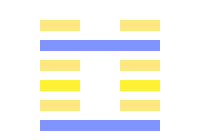
3.1.3.5 (3 > 15) - THE KUN HEXAGRAM
- 1. The first line, undivided, shows the difficulty (its subject has) in advancing. It will be advantageous for him to abide correct and firm; advantageous (also) to be made a feudal ruler.
- 3. The third line, divided, shows one following the deer without (the guidance of) the forester, and only finding himself in the midst of the forest. The superior man, acquainted with the secret risks, thinks it better to give up the chase. If he went forward, he would regret it.
- 5. The fifth line, undivided, shows the difficulties in the way of (its subject's) dispensing the rich favours that might be expected from him. With firmness and correctness there will be good fortune in small things; (even) with them in great things there will be evil.
3.1.3.5 (3 > 15) - Resolving difficulties
One starts by smelling oneself before taking a bath.
Bing DeepL Google Yandex3.1.3.5 (3 > 15) - Resolving difficulties
One starts by smelling oneself before taking a bath.
Bing DeepL Google Yandex3.1.3.5 (3 > 15) - T’un, la difficulté initiale
T’un et tchun : A. 1. Bourgeon, pousse ; 2. Croissance, activité ; 3. Grandir, avancer. — B. Difficultés, arrêté dans son avancement, échec.
- 1. Pour s’établir solidement, il faut se maintenir en fermeté et droiture. (Pour maintenir le royaume), il est bon de constituer des chefs féodaux. Bien qu’on ait des difficultés, la volonté doit toujours s’attacher au devoir. Si, bien qu’élevé, on condescend aux besoins des petits, on s’attachera fortement le peuple.
-
3. Lorsque le gibier poursuivi s’enfonce inopinément dans une forêt profonde, le sage aime mieux l’abandonner que de s’exposer au danger. S’il l’y poursuit, il aura lieu de s’en repentir.
Il sera réduit à l’extrémité. -
5. Dans le développement de la sève des bourgeons, si elle se répand modérément, la croissance sera heureuse ; si elle se répand trop, le croissance sera empêchée.
Il en est ainsi si elle se répand avant d’être suffisamment riche et forte.
Obstacle au développement : s’il est petit, l’issue peut être heureuse ; s’il est grand, fin malheureuse.
3.1.3.5 (3 > 15) - Remédier aux difficultés
On commence par se sentir avant de prendre un bain.
Bing DeepL Google Yandex3.1.3.5 (3 > 15) - Megoldás
- 1. Példamutató ha valaki mások segítségére siet a nehézségek ellenére.
- 3. Magányosan halad ismeretlen terepen. Vezetőt kell keresnie vagy visszafordulnia.
- 5. Tudni akar mielőtt döntene.

3.2.3.5 (3 > 11) - THE KUN HEXAGRAM
- 2. The second line, divided, shows (its subject) distressed and obliged to return; (even) the horses of her chariot (also) seem to be retreating. (But) not by a spoiler (is she assailed), but by one who seeks her to be his wife. The young lady maintains her firm correctness, and declines a union. After ten years she will be united, and have children.
- 3. The third line, divided, shows one following the deer without (the guidance of) the forester, and only finding himself in the midst of the forest. The superior man, acquainted with the secret risks, thinks it better to give up the chase. If he went forward, he would regret it.
- 5. The fifth line, undivided, shows the difficulties in the way of (its subject's) dispensing the rich favours that might be expected from him. With firmness and correctness there will be good fortune in small things; (even) with them in great things there will be evil.
3.2.3.5 (3 > 11) - Resolving difficulties
One is working to clarify a delicate situation.
Bing DeepL Google Yandex3.2.3.5 (3 > 11) - Resolving difficulties
One is working to clarify a delicate situation.
Bing DeepL Google Yandex3.2.3.5 (3 > 11) - T’un, la difficulté initiale
T’un et tchun : A. 1. Bourgeon, pousse ; 2. Croissance, activité ; 3. Grandir, avancer. — B. Difficultés, arrêté dans son avancement, échec.
-
2. 2a. Tchun est comme arrêté par les difficultés, comme un cavalier dont le cheval veut reculer (ou : un cheval monté qui veut...).
2b. C’est comme la jeune fille qui veut épouser un brigand ravisseur, elle doit rester inébranlable et attendre (plutôt) dix ans. (Malgré cela), elle pourra alors se marier et être mère. (Il est ici question de difficultés.)
Un équipage solide, l’enfantement après dix ans indique le retour à la prospérité, à l’avancement. -
3. Lorsque le gibier poursuivi s’enfonce inopinément dans une forêt profonde, le sage aime mieux l’abandonner que de s’exposer au danger. S’il l’y poursuit, il aura lieu de s’en repentir.
Il sera réduit à l’extrémité. -
5. Dans le développement de la sève des bourgeons, si elle se répand modérément, la croissance sera heureuse ; si elle se répand trop, le croissance sera empêchée.
Il en est ainsi si elle se répand avant d’être suffisamment riche et forte.
Obstacle au développement : s’il est petit, l’issue peut être heureuse ; s’il est grand, fin malheureuse.
3.2.3.5 (3 > 11) - Remédier aux difficultés
On travaille dans le but d'éclaircir une situation délicate.
Bing DeepL Google Yandex3.2.3.5 (3 > 11) - Megoldás
- 2. Megbízható kapcsolatokat kell kialakítania mielőtt mások elfogadnák.
- 3. Magányosan halad ismeretlen terepen. Vezetőt kell keresnie vagy visszafordulnia.
- 5. Tudni akar mielőtt döntene.
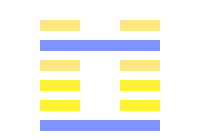
3.1.2.3.5 (3 > 46) - THE KUN HEXAGRAM
- 1. The first line, undivided, shows the difficulty (its subject has) in advancing. It will be advantageous for him to abide correct and firm; advantageous (also) to be made a feudal ruler.
- 2. The second line, divided, shows (its subject) distressed and obliged to return; (even) the horses of her chariot (also) seem to be retreating. (But) not by a spoiler (is she assailed), but by one who seeks her to be his wife. The young lady maintains her firm correctness, and declines a union. After ten years she will be united, and have children.
- 3. The third line, divided, shows one following the deer without (the guidance of) the forester, and only finding himself in the midst of the forest. The superior man, acquainted with the secret risks, thinks it better to give up the chase. If he went forward, he would regret it.
- 5. The fifth line, undivided, shows the difficulties in the way of (its subject's) dispensing the rich favours that might be expected from him. With firmness and correctness there will be good fortune in small things; (even) with them in great things there will be evil.
3.1.2.3.5 (3 > 46) - Knowing how to explain
One knows how to tell others what they have to carry out.
Bing DeepL Google Yandex3.1.2.3.5 (3 > 46) - Knowing how to explain
One knows how to tell others what they have to carry out.
Bing DeepL Google Yandex3.1.2.3.5 (3 > 46) - T’un, la difficulté initiale
T’un et tchun : A. 1. Bourgeon, pousse ; 2. Croissance, activité ; 3. Grandir, avancer. — B. Difficultés, arrêté dans son avancement, échec.
- 1. Pour s’établir solidement, il faut se maintenir en fermeté et droiture. (Pour maintenir le royaume), il est bon de constituer des chefs féodaux. Bien qu’on ait des difficultés, la volonté doit toujours s’attacher au devoir. Si, bien qu’élevé, on condescend aux besoins des petits, on s’attachera fortement le peuple.
-
2. 2a. Tchun est comme arrêté par les difficultés, comme un cavalier dont le cheval veut reculer (ou : un cheval monté qui veut...).
2b. C’est comme la jeune fille qui veut épouser un brigand ravisseur, elle doit rester inébranlable et attendre (plutôt) dix ans. (Malgré cela), elle pourra alors se marier et être mère. (Il est ici question de difficultés.)
Un équipage solide, l’enfantement après dix ans indique le retour à la prospérité, à l’avancement. -
3. Lorsque le gibier poursuivi s’enfonce inopinément dans une forêt profonde, le sage aime mieux l’abandonner que de s’exposer au danger. S’il l’y poursuit, il aura lieu de s’en repentir.
Il sera réduit à l’extrémité. -
5. Dans le développement de la sève des bourgeons, si elle se répand modérément, la croissance sera heureuse ; si elle se répand trop, le croissance sera empêchée.
Il en est ainsi si elle se répand avant d’être suffisamment riche et forte.
Obstacle au développement : s’il est petit, l’issue peut être heureuse ; s’il est grand, fin malheureuse.
3.1.2.3.5 (3 > 46) - Savoir expliquer
On sait comment faire pour dire aux autres ce qu'ils ont à accomplir.
Bing DeepL Google Yandex3.1.2.3.5 (3 > 46) - Megoldás
- 1. Példamutató ha valaki mások segítségére siet a nehézségek ellenére.
- 2. Megbízható kapcsolatokat kell kialakítania mielőtt mások elfogadnák.
- 3. Magányosan halad ismeretlen terepen. Vezetőt kell keresnie vagy visszafordulnia.
- 5. Tudni akar mielőtt döntene.

3.3.4.5 (3 > 55) - THE KUN HEXAGRAM
- 3. The third line, divided, shows one following the deer without (the guidance of) the forester, and only finding himself in the midst of the forest. The superior man, acquainted with the secret risks, thinks it better to give up the chase. If he went forward, he would regret it.
- 4. The fourth line, divided, shows (its subject as a lady), the horses of whose chariot appear in retreat. She seeks, however, (the help of) him who seeks her to be his wife. Advance will be fortunate; all will turn out advantageously.
- 5. The fifth line, undivided, shows the difficulties in the way of (its subject's) dispensing the rich favours that might be expected from him. With firmness and correctness there will be good fortune in small things; (even) with them in great things there will be evil.
3.3.4.5 (3 > 55) - Resolving difficulties
One knows that they will have things to say once others have finished.
Bing DeepL Google Yandex3.3.4.5 (3 > 55) - Resolving difficulties
One knows that they will have things to say once others have finished.
Bing DeepL Google Yandex3.3.4.5 (3 > 55) - T’un, la difficulté initiale
T’un et tchun : A. 1. Bourgeon, pousse ; 2. Croissance, activité ; 3. Grandir, avancer. — B. Difficultés, arrêté dans son avancement, échec.
-
3. Lorsque le gibier poursuivi s’enfonce inopinément dans une forêt profonde, le sage aime mieux l’abandonner que de s’exposer au danger. S’il l’y poursuit, il aura lieu de s’en repentir.
Il sera réduit à l’extrémité. -
4. Si elle est demandée en mariage selon les rites, qu’elle y aille et ce sera bien. Cela lui sera avantageux.
Il en est de même de l’équipage arrêté qui reprend sa course. -
5. Dans le développement de la sève des bourgeons, si elle se répand modérément, la croissance sera heureuse ; si elle se répand trop, le croissance sera empêchée.
Il en est ainsi si elle se répand avant d’être suffisamment riche et forte.
Obstacle au développement : s’il est petit, l’issue peut être heureuse ; s’il est grand, fin malheureuse.
3.3.4.5 (3 > 55) - Remédier aux difficultés
On sait que l'on aura des choses à dire une fois que les autres auront terminé.
Bing DeepL Google Yandex3.3.4.5 (3 > 55) - Megoldás
- 3. Magányosan halad ismeretlen terepen. Vezetőt kell keresnie vagy visszafordulnia.
- 4. Segítséget kap ha kivárja a sorát.
- 5. Tudni akar mielőtt döntene.
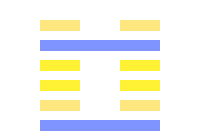
3.1.3.4.5 (3 > 62) - THE KUN HEXAGRAM
- 1. The first line, undivided, shows the difficulty (its subject has) in advancing. It will be advantageous for him to abide correct and firm; advantageous (also) to be made a feudal ruler.
- 3. The third line, divided, shows one following the deer without (the guidance of) the forester, and only finding himself in the midst of the forest. The superior man, acquainted with the secret risks, thinks it better to give up the chase. If he went forward, he would regret it.
- 4. The fourth line, divided, shows (its subject as a lady), the horses of whose chariot appear in retreat. She seeks, however, (the help of) him who seeks her to be his wife. Advance will be fortunate; all will turn out advantageously.
- 5. The fifth line, undivided, shows the difficulties in the way of (its subject's) dispensing the rich favours that might be expected from him. With firmness and correctness there will be good fortune in small things; (even) with them in great things there will be evil.
3.1.3.4.5 (3 > 62) - Resolving difficulties
One wants to compete against those who win every time, but those do not want to take up the challenge.
Bing DeepL Google Yandex3.1.3.4.5 (3 > 62) - Resolving difficulties
One wants to compete against those who win every time, but those do not want to take up the challenge.
Bing DeepL Google Yandex3.1.3.4.5 (3 > 62) - T’un, la difficulté initiale
T’un et tchun : A. 1. Bourgeon, pousse ; 2. Croissance, activité ; 3. Grandir, avancer. — B. Difficultés, arrêté dans son avancement, échec.
- 1. Pour s’établir solidement, il faut se maintenir en fermeté et droiture. (Pour maintenir le royaume), il est bon de constituer des chefs féodaux. Bien qu’on ait des difficultés, la volonté doit toujours s’attacher au devoir. Si, bien qu’élevé, on condescend aux besoins des petits, on s’attachera fortement le peuple.
-
3. Lorsque le gibier poursuivi s’enfonce inopinément dans une forêt profonde, le sage aime mieux l’abandonner que de s’exposer au danger. S’il l’y poursuit, il aura lieu de s’en repentir.
Il sera réduit à l’extrémité. -
4. Si elle est demandée en mariage selon les rites, qu’elle y aille et ce sera bien. Cela lui sera avantageux.
Il en est de même de l’équipage arrêté qui reprend sa course. -
5. Dans le développement de la sève des bourgeons, si elle se répand modérément, la croissance sera heureuse ; si elle se répand trop, le croissance sera empêchée.
Il en est ainsi si elle se répand avant d’être suffisamment riche et forte.
Obstacle au développement : s’il est petit, l’issue peut être heureuse ; s’il est grand, fin malheureuse.
3.1.3.4.5 (3 > 62) - Remédier aux difficultés
On souhaite se mesurer avec ceux qui gagnent tout le temps, mais ceux-là ne veulent pas relever le défi.
Bing DeepL Google Yandex3.1.3.4.5 (3 > 62) - Megoldás
- 1. Példamutató ha valaki mások segítségére siet a nehézségek ellenére.
- 3. Magányosan halad ismeretlen terepen. Vezetőt kell keresnie vagy visszafordulnia.
- 4. Segítséget kap ha kivárja a sorát.
- 5. Tudni akar mielőtt döntene.

3.2.3.4.5 (3 > 34) - THE KUN HEXAGRAM
- 2. The second line, divided, shows (its subject) distressed and obliged to return; (even) the horses of her chariot (also) seem to be retreating. (But) not by a spoiler (is she assailed), but by one who seeks her to be his wife. The young lady maintains her firm correctness, and declines a union. After ten years she will be united, and have children.
- 3. The third line, divided, shows one following the deer without (the guidance of) the forester, and only finding himself in the midst of the forest. The superior man, acquainted with the secret risks, thinks it better to give up the chase. If he went forward, he would regret it.
- 4. The fourth line, divided, shows (its subject as a lady), the horses of whose chariot appear in retreat. She seeks, however, (the help of) him who seeks her to be his wife. Advance will be fortunate; all will turn out advantageously.
- 5. The fifth line, undivided, shows the difficulties in the way of (its subject's) dispensing the rich favours that might be expected from him. With firmness and correctness there will be good fortune in small things; (even) with them in great things there will be evil.
3.2.3.4.5 (3 > 34) - Resolving difficulties
One acts as if others did not hear.
Bing DeepL Google Yandex3.2.3.4.5 (3 > 34) - Resolving difficulties
One acts as if others did not hear.
Bing DeepL Google Yandex3.2.3.4.5 (3 > 34) - T’un, la difficulté initiale
T’un et tchun : A. 1. Bourgeon, pousse ; 2. Croissance, activité ; 3. Grandir, avancer. — B. Difficultés, arrêté dans son avancement, échec.
-
2. 2a. Tchun est comme arrêté par les difficultés, comme un cavalier dont le cheval veut reculer (ou : un cheval monté qui veut...).
2b. C’est comme la jeune fille qui veut épouser un brigand ravisseur, elle doit rester inébranlable et attendre (plutôt) dix ans. (Malgré cela), elle pourra alors se marier et être mère. (Il est ici question de difficultés.)
Un équipage solide, l’enfantement après dix ans indique le retour à la prospérité, à l’avancement. -
3. Lorsque le gibier poursuivi s’enfonce inopinément dans une forêt profonde, le sage aime mieux l’abandonner que de s’exposer au danger. S’il l’y poursuit, il aura lieu de s’en repentir.
Il sera réduit à l’extrémité. -
4. Si elle est demandée en mariage selon les rites, qu’elle y aille et ce sera bien. Cela lui sera avantageux.
Il en est de même de l’équipage arrêté qui reprend sa course. -
5. Dans le développement de la sève des bourgeons, si elle se répand modérément, la croissance sera heureuse ; si elle se répand trop, le croissance sera empêchée.
Il en est ainsi si elle se répand avant d’être suffisamment riche et forte.
Obstacle au développement : s’il est petit, l’issue peut être heureuse ; s’il est grand, fin malheureuse.
3.2.3.4.5 (3 > 34) - Remédier aux difficultés
On fait comme si les autres n'avaient pas entendu.
Bing DeepL Google Yandex3.2.3.4.5 (3 > 34) - Megoldás
- 2. Megbízható kapcsolatokat kell kialakítania mielőtt mások elfogadnák.
- 3. Magányosan halad ismeretlen terepen. Vezetőt kell keresnie vagy visszafordulnia.
- 4. Segítséget kap ha kivárja a sorát.
- 5. Tudni akar mielőtt döntene.

3.1.2.3.4.5 (3 > 32) - THE KUN HEXAGRAM
- 1. The first line, undivided, shows the difficulty (its subject has) in advancing. It will be advantageous for him to abide correct and firm; advantageous (also) to be made a feudal ruler.
- 2. The second line, divided, shows (its subject) distressed and obliged to return; (even) the horses of her chariot (also) seem to be retreating. (But) not by a spoiler (is she assailed), but by one who seeks her to be his wife. The young lady maintains her firm correctness, and declines a union. After ten years she will be united, and have children.
- 3. The third line, divided, shows one following the deer without (the guidance of) the forester, and only finding himself in the midst of the forest. The superior man, acquainted with the secret risks, thinks it better to give up the chase. If he went forward, he would regret it.
- 4. The fourth line, divided, shows (its subject as a lady), the horses of whose chariot appear in retreat. She seeks, however, (the help of) him who seeks her to be his wife. Advance will be fortunate; all will turn out advantageously.
- 5. The fifth line, undivided, shows the difficulties in the way of (its subject's) dispensing the rich favours that might be expected from him. With firmness and correctness there will be good fortune in small things; (even) with them in great things there will be evil.
3.1.2.3.4.5 (3 > 32) - To wait before declaring a winner
One wants to take their time before declaring that others have succeeded.
Bing DeepL Google Yandex3.1.2.3.4.5 (3 > 32) - To wait before declaring a winner
One wants to take their time before declaring that others have succeeded.
Bing DeepL Google Yandex3.1.2.3.4.5 (3 > 32) - T’un, la difficulté initiale
T’un et tchun : A. 1. Bourgeon, pousse ; 2. Croissance, activité ; 3. Grandir, avancer. — B. Difficultés, arrêté dans son avancement, échec.
- 1. Pour s’établir solidement, il faut se maintenir en fermeté et droiture. (Pour maintenir le royaume), il est bon de constituer des chefs féodaux. Bien qu’on ait des difficultés, la volonté doit toujours s’attacher au devoir. Si, bien qu’élevé, on condescend aux besoins des petits, on s’attachera fortement le peuple.
-
2. 2a. Tchun est comme arrêté par les difficultés, comme un cavalier dont le cheval veut reculer (ou : un cheval monté qui veut...).
2b. C’est comme la jeune fille qui veut épouser un brigand ravisseur, elle doit rester inébranlable et attendre (plutôt) dix ans. (Malgré cela), elle pourra alors se marier et être mère. (Il est ici question de difficultés.)
Un équipage solide, l’enfantement après dix ans indique le retour à la prospérité, à l’avancement. -
3. Lorsque le gibier poursuivi s’enfonce inopinément dans une forêt profonde, le sage aime mieux l’abandonner que de s’exposer au danger. S’il l’y poursuit, il aura lieu de s’en repentir.
Il sera réduit à l’extrémité. -
4. Si elle est demandée en mariage selon les rites, qu’elle y aille et ce sera bien. Cela lui sera avantageux.
Il en est de même de l’équipage arrêté qui reprend sa course. -
5. Dans le développement de la sève des bourgeons, si elle se répand modérément, la croissance sera heureuse ; si elle se répand trop, le croissance sera empêchée.
Il en est ainsi si elle se répand avant d’être suffisamment riche et forte.
Obstacle au développement : s’il est petit, l’issue peut être heureuse ; s’il est grand, fin malheureuse.
3.1.2.3.4.5 (3 > 32) - Attendre avant de déclarer un vainqueur
On veut prendre son temps avant de déclarer que les autres ont réussi.
Bing DeepL Google Yandex3.1.2.3.4.5 (3 > 32) - Megoldás
- 1. Példamutató ha valaki mások segítségére siet a nehézségek ellenére.
- 2. Megbízható kapcsolatokat kell kialakítania mielőtt mások elfogadnák.
- 3. Magányosan halad ismeretlen terepen. Vezetőt kell keresnie vagy visszafordulnia.
- 4. Segítséget kap ha kivárja a sorát.
- 5. Tudni akar mielőtt döntene.

3.3.6 (3 > 37) - THE KUN HEXAGRAM
- 3. The third line, divided, shows one following the deer without (the guidance of) the forester, and only finding himself in the midst of the forest. The superior man, acquainted with the secret risks, thinks it better to give up the chase. If he went forward, he would regret it.
- 6. The topmost line, divided, shows (its subject) with the horses of his chariot obliged to retreat, and weeping tears of blood in streams.
3.3.6 (3 > 37) - Resolving difficulties
Others appear as ungrateful when they are offered something without giving anything in return.
Bing DeepL Google Yandex3.3.6 (3 > 37) - Resolving difficulties
Others appear as ungrateful when they are offered something without giving anything in return.
Bing DeepL Google Yandex3.3.6 (3 > 37) - T’un, la difficulté initiale
T’un et tchun : A. 1. Bourgeon, pousse ; 2. Croissance, activité ; 3. Grandir, avancer. — B. Difficultés, arrêté dans son avancement, échec.
-
3. Lorsque le gibier poursuivi s’enfonce inopinément dans une forêt profonde, le sage aime mieux l’abandonner que de s’exposer au danger. S’il l’y poursuit, il aura lieu de s’en repentir.
Il sera réduit à l’extrémité. - 6. L’avancement, arrêté comme un cheval monté qui recule, fait répandre des larmes amères et abondantes.
3.3.6 (3 > 37) - Remédier aux difficultés
Les autres passent pour des ingrats quand on leur donne quelque chose sans qu'ils ne proposent rien en échange.
Bing DeepL Google Yandex3.3.6 (3 > 37) - Megoldás
- 3. Magányosan halad ismeretlen terepen. Vezetőt kell keresnie vagy visszafordulnia.
- 6. Egyedül folytatja tovább mert mások biztosítékokat akarnak mielőtt támogatnák a fejlesztéseket. Tétotvázás helyett meg kell változtatnia szomszédságát hogy túlléphessen a nehézségeken.

3.1.3.6 (3 > 53) - THE KUN HEXAGRAM
- 1. The first line, undivided, shows the difficulty (its subject has) in advancing. It will be advantageous for him to abide correct and firm; advantageous (also) to be made a feudal ruler.
- 3. The third line, divided, shows one following the deer without (the guidance of) the forester, and only finding himself in the midst of the forest. The superior man, acquainted with the secret risks, thinks it better to give up the chase. If he went forward, he would regret it.
- 6. The topmost line, divided, shows (its subject) with the horses of his chariot obliged to retreat, and weeping tears of blood in streams.
3.1.3.6 (3 > 53) - Accepting mutual assistance
One assumes that they have sufficient resources to make an association.
Bing DeepL Google Yandex3.1.3.6 (3 > 53) - Accepting mutual assistance
One assumes that they have sufficient resources to make an association.
Bing DeepL Google Yandex3.1.3.6 (3 > 53) - T’un, la difficulté initiale
T’un et tchun : A. 1. Bourgeon, pousse ; 2. Croissance, activité ; 3. Grandir, avancer. — B. Difficultés, arrêté dans son avancement, échec.
- 1. Pour s’établir solidement, il faut se maintenir en fermeté et droiture. (Pour maintenir le royaume), il est bon de constituer des chefs féodaux. Bien qu’on ait des difficultés, la volonté doit toujours s’attacher au devoir. Si, bien qu’élevé, on condescend aux besoins des petits, on s’attachera fortement le peuple.
-
3. Lorsque le gibier poursuivi s’enfonce inopinément dans une forêt profonde, le sage aime mieux l’abandonner que de s’exposer au danger. S’il l’y poursuit, il aura lieu de s’en repentir.
Il sera réduit à l’extrémité. - 6. L’avancement, arrêté comme un cheval monté qui recule, fait répandre des larmes amères et abondantes.
3.1.3.6 (3 > 53) - Accepter l'entraide
On suppose que l'on a suffisamment de ressources pour former une association.
Bing DeepL Google Yandex3.1.3.6 (3 > 53) - Megoldás
- 1. Példamutató ha valaki mások segítségére siet a nehézségek ellenére.
- 3. Magányosan halad ismeretlen terepen. Vezetőt kell keresnie vagy visszafordulnia.
- 6. Egyedül folytatja tovább mert mások biztosítékokat akarnak mielőtt támogatnák a fejlesztéseket. Tétotvázás helyett meg kell változtatnia szomszédságát hogy túlléphessen a nehézségeken.

3.2.3.6 (3 > 9) - THE KUN HEXAGRAM
- 2. The second line, divided, shows (its subject) distressed and obliged to return; (even) the horses of her chariot (also) seem to be retreating. (But) not by a spoiler (is she assailed), but by one who seeks her to be his wife. The young lady maintains her firm correctness, and declines a union. After ten years she will be united, and have children.
- 3. The third line, divided, shows one following the deer without (the guidance of) the forester, and only finding himself in the midst of the forest. The superior man, acquainted with the secret risks, thinks it better to give up the chase. If he went forward, he would regret it.
- 6. The topmost line, divided, shows (its subject) with the horses of his chariot obliged to retreat, and weeping tears of blood in streams.
3.2.3.6 (3 > 9) - Resolving difficulties
One does the impossible to satisfy others.
Bing DeepL Google Yandex3.2.3.6 (3 > 9) - Resolving difficulties
One does the impossible to satisfy others.
Bing DeepL Google Yandex3.2.3.6 (3 > 9) - T’un, la difficulté initiale
T’un et tchun : A. 1. Bourgeon, pousse ; 2. Croissance, activité ; 3. Grandir, avancer. — B. Difficultés, arrêté dans son avancement, échec.
-
2. 2a. Tchun est comme arrêté par les difficultés, comme un cavalier dont le cheval veut reculer (ou : un cheval monté qui veut...).
2b. C’est comme la jeune fille qui veut épouser un brigand ravisseur, elle doit rester inébranlable et attendre (plutôt) dix ans. (Malgré cela), elle pourra alors se marier et être mère. (Il est ici question de difficultés.)
Un équipage solide, l’enfantement après dix ans indique le retour à la prospérité, à l’avancement. -
3. Lorsque le gibier poursuivi s’enfonce inopinément dans une forêt profonde, le sage aime mieux l’abandonner que de s’exposer au danger. S’il l’y poursuit, il aura lieu de s’en repentir.
Il sera réduit à l’extrémité. - 6. L’avancement, arrêté comme un cheval monté qui recule, fait répandre des larmes amères et abondantes.
3.2.3.6 (3 > 9) - Remédier aux difficultés
On fait l'impossible pour que les autres soient satisfaits.
Bing DeepL Google Yandex3.2.3.6 (3 > 9) - Megoldás
- 2. Megbízható kapcsolatokat kell kialakítania mielőtt mások elfogadnák.
- 3. Magányosan halad ismeretlen terepen. Vezetőt kell keresnie vagy visszafordulnia.
- 6. Egyedül folytatja tovább mert mások biztosítékokat akarnak mielőtt támogatnák a fejlesztéseket. Tétotvázás helyett meg kell változtatnia szomszédságát hogy túlléphessen a nehézségeken.

3.1.2.3.6 (3 > 57) - THE KUN HEXAGRAM
- 1. The first line, undivided, shows the difficulty (its subject has) in advancing. It will be advantageous for him to abide correct and firm; advantageous (also) to be made a feudal ruler.
- 2. The second line, divided, shows (its subject) distressed and obliged to return; (even) the horses of her chariot (also) seem to be retreating. (But) not by a spoiler (is she assailed), but by one who seeks her to be his wife. The young lady maintains her firm correctness, and declines a union. After ten years she will be united, and have children.
- 3. The third line, divided, shows one following the deer without (the guidance of) the forester, and only finding himself in the midst of the forest. The superior man, acquainted with the secret risks, thinks it better to give up the chase. If he went forward, he would regret it.
- 6. The topmost line, divided, shows (its subject) with the horses of his chariot obliged to retreat, and weeping tears of blood in streams.
3.1.2.3.6 (3 > 57) - Resolving difficulties
One is doing things that others have not deemed necessary.
Bing DeepL Google Yandex3.1.2.3.6 (3 > 57) - Resolving difficulties
One is doing things that others have not deemed necessary.
Bing DeepL Google Yandex3.1.2.3.6 (3 > 57) - T’un, la difficulté initiale
T’un et tchun : A. 1. Bourgeon, pousse ; 2. Croissance, activité ; 3. Grandir, avancer. — B. Difficultés, arrêté dans son avancement, échec.
- 1. Pour s’établir solidement, il faut se maintenir en fermeté et droiture. (Pour maintenir le royaume), il est bon de constituer des chefs féodaux. Bien qu’on ait des difficultés, la volonté doit toujours s’attacher au devoir. Si, bien qu’élevé, on condescend aux besoins des petits, on s’attachera fortement le peuple.
-
2. 2a. Tchun est comme arrêté par les difficultés, comme un cavalier dont le cheval veut reculer (ou : un cheval monté qui veut...).
2b. C’est comme la jeune fille qui veut épouser un brigand ravisseur, elle doit rester inébranlable et attendre (plutôt) dix ans. (Malgré cela), elle pourra alors se marier et être mère. (Il est ici question de difficultés.)
Un équipage solide, l’enfantement après dix ans indique le retour à la prospérité, à l’avancement. -
3. Lorsque le gibier poursuivi s’enfonce inopinément dans une forêt profonde, le sage aime mieux l’abandonner que de s’exposer au danger. S’il l’y poursuit, il aura lieu de s’en repentir.
Il sera réduit à l’extrémité. - 6. L’avancement, arrêté comme un cheval monté qui recule, fait répandre des larmes amères et abondantes.
3.1.2.3.6 (3 > 57) - Remédier aux difficultés
On fait des choses que les autres n'ont pas estimées nécessaires.
Bing DeepL Google Yandex3.1.2.3.6 (3 > 57) - Megoldás
- 1. Példamutató ha valaki mások segítségére siet a nehézségek ellenére.
- 2. Megbízható kapcsolatokat kell kialakítania mielőtt mások elfogadnák.
- 3. Magányosan halad ismeretlen terepen. Vezetőt kell keresnie vagy visszafordulnia.
- 6. Egyedül folytatja tovább mert mások biztosítékokat akarnak mielőtt támogatnák a fejlesztéseket. Tétotvázás helyett meg kell változtatnia szomszédságát hogy túlléphessen a nehézségeken.

3.3.4.6 (3 > 13) - THE KUN HEXAGRAM
- 3. The third line, divided, shows one following the deer without (the guidance of) the forester, and only finding himself in the midst of the forest. The superior man, acquainted with the secret risks, thinks it better to give up the chase. If he went forward, he would regret it.
- 4. The fourth line, divided, shows (its subject as a lady), the horses of whose chariot appear in retreat. She seeks, however, (the help of) him who seeks her to be his wife. Advance will be fortunate; all will turn out advantageously.
- 6. The topmost line, divided, shows (its subject) with the horses of his chariot obliged to retreat, and weeping tears of blood in streams.
3.3.4.6 (3 > 13) - Resolving difficulties
One thinks about preparing apologies for those who could not join the group.
Bing DeepL Google Yandex3.3.4.6 (3 > 13) - Resolving difficulties
One thinks about preparing apologies for those who could not join the group.
Bing DeepL Google Yandex3.3.4.6 (3 > 13) - T’un, la difficulté initiale
T’un et tchun : A. 1. Bourgeon, pousse ; 2. Croissance, activité ; 3. Grandir, avancer. — B. Difficultés, arrêté dans son avancement, échec.
-
3. Lorsque le gibier poursuivi s’enfonce inopinément dans une forêt profonde, le sage aime mieux l’abandonner que de s’exposer au danger. S’il l’y poursuit, il aura lieu de s’en repentir.
Il sera réduit à l’extrémité. -
4. Si elle est demandée en mariage selon les rites, qu’elle y aille et ce sera bien. Cela lui sera avantageux.
Il en est de même de l’équipage arrêté qui reprend sa course. - 6. L’avancement, arrêté comme un cheval monté qui recule, fait répandre des larmes amères et abondantes.
3.3.4.6 (3 > 13) - Remédier aux difficultés
On pense à préparer des excuses pour ceux qui n'ont pas pu rejoindre le groupe.
Bing DeepL Google Yandex3.3.4.6 (3 > 13) - Megoldás
- 3. Magányosan halad ismeretlen terepen. Vezetőt kell keresnie vagy visszafordulnia.
- 4. Segítséget kap ha kivárja a sorát.
- 6. Egyedül folytatja tovább mert mások biztosítékokat akarnak mielőtt támogatnák a fejlesztéseket. Tétotvázás helyett meg kell változtatnia szomszédságát hogy túlléphessen a nehézségeken.

3.1.3.4.6 (3 > 33) - THE KUN HEXAGRAM
- 1. The first line, undivided, shows the difficulty (its subject has) in advancing. It will be advantageous for him to abide correct and firm; advantageous (also) to be made a feudal ruler.
- 3. The third line, divided, shows one following the deer without (the guidance of) the forester, and only finding himself in the midst of the forest. The superior man, acquainted with the secret risks, thinks it better to give up the chase. If he went forward, he would regret it.
- 4. The fourth line, divided, shows (its subject as a lady), the horses of whose chariot appear in retreat. She seeks, however, (the help of) him who seeks her to be his wife. Advance will be fortunate; all will turn out advantageously.
- 6. The topmost line, divided, shows (its subject) with the horses of his chariot obliged to retreat, and weeping tears of blood in streams.
3.1.3.4.6 (3 > 33) - Resolving difficulties
One makes their own a motto that they have heard elsewhere.
Bing DeepL Google Yandex3.1.3.4.6 (3 > 33) - Resolving difficulties
One makes their own a motto that they have heard elsewhere.
Bing DeepL Google Yandex3.1.3.4.6 (3 > 33) - T’un, la difficulté initiale
T’un et tchun : A. 1. Bourgeon, pousse ; 2. Croissance, activité ; 3. Grandir, avancer. — B. Difficultés, arrêté dans son avancement, échec.
- 1. Pour s’établir solidement, il faut se maintenir en fermeté et droiture. (Pour maintenir le royaume), il est bon de constituer des chefs féodaux. Bien qu’on ait des difficultés, la volonté doit toujours s’attacher au devoir. Si, bien qu’élevé, on condescend aux besoins des petits, on s’attachera fortement le peuple.
-
3. Lorsque le gibier poursuivi s’enfonce inopinément dans une forêt profonde, le sage aime mieux l’abandonner que de s’exposer au danger. S’il l’y poursuit, il aura lieu de s’en repentir.
Il sera réduit à l’extrémité. -
4. Si elle est demandée en mariage selon les rites, qu’elle y aille et ce sera bien. Cela lui sera avantageux.
Il en est de même de l’équipage arrêté qui reprend sa course. - 6. L’avancement, arrêté comme un cheval monté qui recule, fait répandre des larmes amères et abondantes.
3.1.3.4.6 (3 > 33) - Remédier aux difficultés
On fait sienne une devise que l'on a entendue ailleurs.
Bing DeepL Google Yandex3.1.3.4.6 (3 > 33) - Megoldás
- 1. Példamutató ha valaki mások segítségére siet a nehézségek ellenére.
- 3. Magányosan halad ismeretlen terepen. Vezetőt kell keresnie vagy visszafordulnia.
- 4. Segítséget kap ha kivárja a sorát.
- 6. Egyedül folytatja tovább mert mások biztosítékokat akarnak mielőtt támogatnák a fejlesztéseket. Tétotvázás helyett meg kell változtatnia szomszédságát hogy túlléphessen a nehézségeken.

3.2.3.4.6 (3 > 1) - THE KUN HEXAGRAM
- 2. The second line, divided, shows (its subject) distressed and obliged to return; (even) the horses of her chariot (also) seem to be retreating. (But) not by a spoiler (is she assailed), but by one who seeks her to be his wife. The young lady maintains her firm correctness, and declines a union. After ten years she will be united, and have children.
- 3. The third line, divided, shows one following the deer without (the guidance of) the forester, and only finding himself in the midst of the forest. The superior man, acquainted with the secret risks, thinks it better to give up the chase. If he went forward, he would regret it.
- 4. The fourth line, divided, shows (its subject as a lady), the horses of whose chariot appear in retreat. She seeks, however, (the help of) him who seeks her to be his wife. Advance will be fortunate; all will turn out advantageously.
- 6. The topmost line, divided, shows (its subject) with the horses of his chariot obliged to retreat, and weeping tears of blood in streams.
3.2.3.4.6 (3 > 1) - Overcoming one's fears
One needs to question the others before they can free oneself from their anxieties.
Bing DeepL Google Yandex3.2.3.4.6 (3 > 1) - Overcoming one's fears
One needs to question the others before they can free oneself from their anxieties.
Bing DeepL Google Yandex3.2.3.4.6 (3 > 1) - T’un, la difficulté initiale
T’un et tchun : A. 1. Bourgeon, pousse ; 2. Croissance, activité ; 3. Grandir, avancer. — B. Difficultés, arrêté dans son avancement, échec.
-
2. 2a. Tchun est comme arrêté par les difficultés, comme un cavalier dont le cheval veut reculer (ou : un cheval monté qui veut...).
2b. C’est comme la jeune fille qui veut épouser un brigand ravisseur, elle doit rester inébranlable et attendre (plutôt) dix ans. (Malgré cela), elle pourra alors se marier et être mère. (Il est ici question de difficultés.)
Un équipage solide, l’enfantement après dix ans indique le retour à la prospérité, à l’avancement. -
3. Lorsque le gibier poursuivi s’enfonce inopinément dans une forêt profonde, le sage aime mieux l’abandonner que de s’exposer au danger. S’il l’y poursuit, il aura lieu de s’en repentir.
Il sera réduit à l’extrémité. -
4. Si elle est demandée en mariage selon les rites, qu’elle y aille et ce sera bien. Cela lui sera avantageux.
Il en est de même de l’équipage arrêté qui reprend sa course. - 6. L’avancement, arrêté comme un cheval monté qui recule, fait répandre des larmes amères et abondantes.
3.2.3.4.6 (3 > 1) - Surmonter ses craintes
On doit interroger les autres avant de pouvoir se libérer de ses angoisses.
Bing DeepL Google Yandex3.2.3.4.6 (3 > 1) - Megoldás
- 2. Megbízható kapcsolatokat kell kialakítania mielőtt mások elfogadnák.
- 3. Magányosan halad ismeretlen terepen. Vezetőt kell keresnie vagy visszafordulnia.
- 4. Segítséget kap ha kivárja a sorát.
- 6. Egyedül folytatja tovább mert mások biztosítékokat akarnak mielőtt támogatnák a fejlesztéseket. Tétotvázás helyett meg kell változtatnia szomszédságát hogy túlléphessen a nehézségeken.

3.1.2.3.4.6 (3 > 44) - THE KUN HEXAGRAM
- 1. The first line, undivided, shows the difficulty (its subject has) in advancing. It will be advantageous for him to abide correct and firm; advantageous (also) to be made a feudal ruler.
- 2. The second line, divided, shows (its subject) distressed and obliged to return; (even) the horses of her chariot (also) seem to be retreating. (But) not by a spoiler (is she assailed), but by one who seeks her to be his wife. The young lady maintains her firm correctness, and declines a union. After ten years she will be united, and have children.
- 3. The third line, divided, shows one following the deer without (the guidance of) the forester, and only finding himself in the midst of the forest. The superior man, acquainted with the secret risks, thinks it better to give up the chase. If he went forward, he would regret it.
- 4. The fourth line, divided, shows (its subject as a lady), the horses of whose chariot appear in retreat. She seeks, however, (the help of) him who seeks her to be his wife. Advance will be fortunate; all will turn out advantageously.
- 6. The topmost line, divided, shows (its subject) with the horses of his chariot obliged to retreat, and weeping tears of blood in streams.
3.1.2.3.4.6 (3 > 44) - Resolving difficulties
One becomes a schemer to indulge their most guilty instincts.
Bing DeepL Google Yandex3.1.2.3.4.6 (3 > 44) - Resolving difficulties
One becomes a schemer to indulge their most guilty instincts.
Bing DeepL Google Yandex3.1.2.3.4.6 (3 > 44) - T’un, la difficulté initiale
T’un et tchun : A. 1. Bourgeon, pousse ; 2. Croissance, activité ; 3. Grandir, avancer. — B. Difficultés, arrêté dans son avancement, échec.
- 1. Pour s’établir solidement, il faut se maintenir en fermeté et droiture. (Pour maintenir le royaume), il est bon de constituer des chefs féodaux. Bien qu’on ait des difficultés, la volonté doit toujours s’attacher au devoir. Si, bien qu’élevé, on condescend aux besoins des petits, on s’attachera fortement le peuple.
-
2. 2a. Tchun est comme arrêté par les difficultés, comme un cavalier dont le cheval veut reculer (ou : un cheval monté qui veut...).
2b. C’est comme la jeune fille qui veut épouser un brigand ravisseur, elle doit rester inébranlable et attendre (plutôt) dix ans. (Malgré cela), elle pourra alors se marier et être mère. (Il est ici question de difficultés.)
Un équipage solide, l’enfantement après dix ans indique le retour à la prospérité, à l’avancement. -
3. Lorsque le gibier poursuivi s’enfonce inopinément dans une forêt profonde, le sage aime mieux l’abandonner que de s’exposer au danger. S’il l’y poursuit, il aura lieu de s’en repentir.
Il sera réduit à l’extrémité. -
4. Si elle est demandée en mariage selon les rites, qu’elle y aille et ce sera bien. Cela lui sera avantageux.
Il en est de même de l’équipage arrêté qui reprend sa course. - 6. L’avancement, arrêté comme un cheval monté qui recule, fait répandre des larmes amères et abondantes.
3.1.2.3.4.6 (3 > 44) - Remédier aux difficultés
On devient intriguant pour satisfaire ses instincts les plus coupables.
Bing DeepL Google Yandex3.1.2.3.4.6 (3 > 44) - Megoldás
- 1. Példamutató ha valaki mások segítségére siet a nehézségek ellenére.
- 2. Megbízható kapcsolatokat kell kialakítania mielőtt mások elfogadnák.
- 3. Magányosan halad ismeretlen terepen. Vezetőt kell keresnie vagy visszafordulnia.
- 4. Segítséget kap ha kivárja a sorát.
- 6. Egyedül folytatja tovább mert mások biztosítékokat akarnak mielőtt támogatnák a fejlesztéseket. Tétotvázás helyett meg kell változtatnia szomszédságát hogy túlléphessen a nehézségeken.

3.3.5.6 (3 > 22) - THE KUN HEXAGRAM
- 3. The third line, divided, shows one following the deer without (the guidance of) the forester, and only finding himself in the midst of the forest. The superior man, acquainted with the secret risks, thinks it better to give up the chase. If he went forward, he would regret it.
- 5. The fifth line, undivided, shows the difficulties in the way of (its subject's) dispensing the rich favours that might be expected from him. With firmness and correctness there will be good fortune in small things; (even) with them in great things there will be evil.
- 6. The topmost line, divided, shows (its subject) with the horses of his chariot obliged to retreat, and weeping tears of blood in streams.
3.3.5.6 (3 > 22) - Being suspicious of everything
One does as if others had no chance of becoming trustworthy.
Bing DeepL Google Yandex3.3.5.6 (3 > 22) - Being suspicious of everything
One does as if others had no chance of becoming trustworthy.
Bing DeepL Google Yandex3.3.5.6 (3 > 22) - T’un, la difficulté initiale
T’un et tchun : A. 1. Bourgeon, pousse ; 2. Croissance, activité ; 3. Grandir, avancer. — B. Difficultés, arrêté dans son avancement, échec.
-
3. Lorsque le gibier poursuivi s’enfonce inopinément dans une forêt profonde, le sage aime mieux l’abandonner que de s’exposer au danger. S’il l’y poursuit, il aura lieu de s’en repentir.
Il sera réduit à l’extrémité. -
5. Dans le développement de la sève des bourgeons, si elle se répand modérément, la croissance sera heureuse ; si elle se répand trop, le croissance sera empêchée.
Il en est ainsi si elle se répand avant d’être suffisamment riche et forte.
Obstacle au développement : s’il est petit, l’issue peut être heureuse ; s’il est grand, fin malheureuse. - 6. L’avancement, arrêté comme un cheval monté qui recule, fait répandre des larmes amères et abondantes.
3.3.5.6 (3 > 22) - Se méfier de tout
On fait comme si les autres n'avaient aucune chance de devenir dignes de confiance.
Bing DeepL Google Yandex3.3.5.6 (3 > 22) - Megoldás
- 3. Magányosan halad ismeretlen terepen. Vezetőt kell keresnie vagy visszafordulnia.
- 5. Tudni akar mielőtt döntene.
- 6. Egyedül folytatja tovább mert mások biztosítékokat akarnak mielőtt támogatnák a fejlesztéseket. Tétotvázás helyett meg kell változtatnia szomszédságát hogy túlléphessen a nehézségeken.
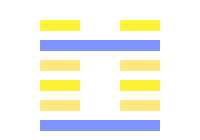
3.1.3.5.6 (3 > 52) - THE KUN HEXAGRAM
- 1. The first line, undivided, shows the difficulty (its subject has) in advancing. It will be advantageous for him to abide correct and firm; advantageous (also) to be made a feudal ruler.
- 3. The third line, divided, shows one following the deer without (the guidance of) the forester, and only finding himself in the midst of the forest. The superior man, acquainted with the secret risks, thinks it better to give up the chase. If he went forward, he would regret it.
- 5. The fifth line, undivided, shows the difficulties in the way of (its subject's) dispensing the rich favours that might be expected from him. With firmness and correctness there will be good fortune in small things; (even) with them in great things there will be evil.
- 6. The topmost line, divided, shows (its subject) with the horses of his chariot obliged to retreat, and weeping tears of blood in streams.
3.1.3.5.6 (3 > 52) - Revealing a conspiracy
One receives evidence that shows that they may have been betrayed.
Bing DeepL Google Yandex3.1.3.5.6 (3 > 52) - Revealing a conspiracy
One receives evidence that shows that they may have been betrayed.
Bing DeepL Google Yandex3.1.3.5.6 (3 > 52) - T’un, la difficulté initiale
T’un et tchun : A. 1. Bourgeon, pousse ; 2. Croissance, activité ; 3. Grandir, avancer. — B. Difficultés, arrêté dans son avancement, échec.
- 1. Pour s’établir solidement, il faut se maintenir en fermeté et droiture. (Pour maintenir le royaume), il est bon de constituer des chefs féodaux. Bien qu’on ait des difficultés, la volonté doit toujours s’attacher au devoir. Si, bien qu’élevé, on condescend aux besoins des petits, on s’attachera fortement le peuple.
-
3. Lorsque le gibier poursuivi s’enfonce inopinément dans une forêt profonde, le sage aime mieux l’abandonner que de s’exposer au danger. S’il l’y poursuit, il aura lieu de s’en repentir.
Il sera réduit à l’extrémité. -
5. Dans le développement de la sève des bourgeons, si elle se répand modérément, la croissance sera heureuse ; si elle se répand trop, le croissance sera empêchée.
Il en est ainsi si elle se répand avant d’être suffisamment riche et forte.
Obstacle au développement : s’il est petit, l’issue peut être heureuse ; s’il est grand, fin malheureuse. - 6. L’avancement, arrêté comme un cheval monté qui recule, fait répandre des larmes amères et abondantes.
3.1.3.5.6 (3 > 52) - Révéler un complot
On reçoit des éléments qui montrent que l'on a pu avoir été trahi.
Bing DeepL Google Yandex3.1.3.5.6 (3 > 52) - Megoldás
- 1. Példamutató ha valaki mások segítségére siet a nehézségek ellenére.
- 3. Magányosan halad ismeretlen terepen. Vezetőt kell keresnie vagy visszafordulnia.
- 5. Tudni akar mielőtt döntene.
- 6. Egyedül folytatja tovább mert mások biztosítékokat akarnak mielőtt támogatnák a fejlesztéseket. Tétotvázás helyett meg kell változtatnia szomszédságát hogy túlléphessen a nehézségeken.

3.2.3.5.6 (3 > 26) - THE KUN HEXAGRAM
- 2. The second line, divided, shows (its subject) distressed and obliged to return; (even) the horses of her chariot (also) seem to be retreating. (But) not by a spoiler (is she assailed), but by one who seeks her to be his wife. The young lady maintains her firm correctness, and declines a union. After ten years she will be united, and have children.
- 3. The third line, divided, shows one following the deer without (the guidance of) the forester, and only finding himself in the midst of the forest. The superior man, acquainted with the secret risks, thinks it better to give up the chase. If he went forward, he would regret it.
- 5. The fifth line, undivided, shows the difficulties in the way of (its subject's) dispensing the rich favours that might be expected from him. With firmness and correctness there will be good fortune in small things; (even) with them in great things there will be evil.
- 6. The topmost line, divided, shows (its subject) with the horses of his chariot obliged to retreat, and weeping tears of blood in streams.
3.2.3.5.6 (3 > 26) - Containing hesitations
One tempers others so as to prevent them from moving forward hesitantly.
Bing DeepL Google Yandex3.2.3.5.6 (3 > 26) - Containing hesitations
One tempers others so as to prevent them from moving forward hesitantly.
Bing DeepL Google Yandex3.2.3.5.6 (3 > 26) - T’un, la difficulté initiale
T’un et tchun : A. 1. Bourgeon, pousse ; 2. Croissance, activité ; 3. Grandir, avancer. — B. Difficultés, arrêté dans son avancement, échec.
-
2. 2a. Tchun est comme arrêté par les difficultés, comme un cavalier dont le cheval veut reculer (ou : un cheval monté qui veut...).
2b. C’est comme la jeune fille qui veut épouser un brigand ravisseur, elle doit rester inébranlable et attendre (plutôt) dix ans. (Malgré cela), elle pourra alors se marier et être mère. (Il est ici question de difficultés.)
Un équipage solide, l’enfantement après dix ans indique le retour à la prospérité, à l’avancement. -
3. Lorsque le gibier poursuivi s’enfonce inopinément dans une forêt profonde, le sage aime mieux l’abandonner que de s’exposer au danger. S’il l’y poursuit, il aura lieu de s’en repentir.
Il sera réduit à l’extrémité. -
5. Dans le développement de la sève des bourgeons, si elle se répand modérément, la croissance sera heureuse ; si elle se répand trop, le croissance sera empêchée.
Il en est ainsi si elle se répand avant d’être suffisamment riche et forte.
Obstacle au développement : s’il est petit, l’issue peut être heureuse ; s’il est grand, fin malheureuse. - 6. L’avancement, arrêté comme un cheval monté qui recule, fait répandre des larmes amères et abondantes.
3.2.3.5.6 (3 > 26) - Contenir les hésitations
On freine les autres pour les empêcher d'avancer en hésitant.
Bing DeepL Google Yandex3.2.3.5.6 (3 > 26) - Megoldás
- 2. Megbízható kapcsolatokat kell kialakítania mielőtt mások elfogadnák.
- 3. Magányosan halad ismeretlen terepen. Vezetőt kell keresnie vagy visszafordulnia.
- 5. Tudni akar mielőtt döntene.
- 6. Egyedül folytatja tovább mert mások biztosítékokat akarnak mielőtt támogatnák a fejlesztéseket. Tétotvázás helyett meg kell változtatnia szomszédságát hogy túlléphessen a nehézségeken.
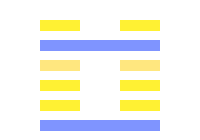
3.1.2.3.5.6 (3 > 18) - THE KUN HEXAGRAM
- 1. The first line, undivided, shows the difficulty (its subject has) in advancing. It will be advantageous for him to abide correct and firm; advantageous (also) to be made a feudal ruler.
- 2. The second line, divided, shows (its subject) distressed and obliged to return; (even) the horses of her chariot (also) seem to be retreating. (But) not by a spoiler (is she assailed), but by one who seeks her to be his wife. The young lady maintains her firm correctness, and declines a union. After ten years she will be united, and have children.
- 3. The third line, divided, shows one following the deer without (the guidance of) the forester, and only finding himself in the midst of the forest. The superior man, acquainted with the secret risks, thinks it better to give up the chase. If he went forward, he would regret it.
- 5. The fifth line, undivided, shows the difficulties in the way of (its subject's) dispensing the rich favours that might be expected from him. With firmness and correctness there will be good fortune in small things; (even) with them in great things there will be evil.
- 6. The topmost line, divided, shows (its subject) with the horses of his chariot obliged to retreat, and weeping tears of blood in streams.
3.1.2.3.5.6 (3 > 18) - Resolving difficulties
One believes oneself above others when they should highlight them.
Bing DeepL Google Yandex3.1.2.3.5.6 (3 > 18) - Resolving difficulties
One believes oneself above others when they should highlight them.
Bing DeepL Google Yandex3.1.2.3.5.6 (3 > 18) - T’un, la difficulté initiale
T’un et tchun : A. 1. Bourgeon, pousse ; 2. Croissance, activité ; 3. Grandir, avancer. — B. Difficultés, arrêté dans son avancement, échec.
- 1. Pour s’établir solidement, il faut se maintenir en fermeté et droiture. (Pour maintenir le royaume), il est bon de constituer des chefs féodaux. Bien qu’on ait des difficultés, la volonté doit toujours s’attacher au devoir. Si, bien qu’élevé, on condescend aux besoins des petits, on s’attachera fortement le peuple.
-
2. 2a. Tchun est comme arrêté par les difficultés, comme un cavalier dont le cheval veut reculer (ou : un cheval monté qui veut...).
2b. C’est comme la jeune fille qui veut épouser un brigand ravisseur, elle doit rester inébranlable et attendre (plutôt) dix ans. (Malgré cela), elle pourra alors se marier et être mère. (Il est ici question de difficultés.)
Un équipage solide, l’enfantement après dix ans indique le retour à la prospérité, à l’avancement. -
3. Lorsque le gibier poursuivi s’enfonce inopinément dans une forêt profonde, le sage aime mieux l’abandonner que de s’exposer au danger. S’il l’y poursuit, il aura lieu de s’en repentir.
Il sera réduit à l’extrémité. -
5. Dans le développement de la sève des bourgeons, si elle se répand modérément, la croissance sera heureuse ; si elle se répand trop, le croissance sera empêchée.
Il en est ainsi si elle se répand avant d’être suffisamment riche et forte.
Obstacle au développement : s’il est petit, l’issue peut être heureuse ; s’il est grand, fin malheureuse. - 6. L’avancement, arrêté comme un cheval monté qui recule, fait répandre des larmes amères et abondantes.
3.1.2.3.5.6 (3 > 18) - Remédier aux difficultés
On se croit au-dessus des autres alors qu'on devrait les mettre en valeur.
Bing DeepL Google Yandex3.1.2.3.5.6 (3 > 18) - Megoldás
- 1. Példamutató ha valaki mások segítségére siet a nehézségek ellenére.
- 2. Megbízható kapcsolatokat kell kialakítania mielőtt mások elfogadnák.
- 3. Magányosan halad ismeretlen terepen. Vezetőt kell keresnie vagy visszafordulnia.
- 5. Tudni akar mielőtt döntene.
- 6. Egyedül folytatja tovább mert mások biztosítékokat akarnak mielőtt támogatnák a fejlesztéseket. Tétotvázás helyett meg kell változtatnia szomszédságát hogy túlléphessen a nehézségeken.

3.3.4.5.6 (3 > 30) - THE KUN HEXAGRAM
- 3. The third line, divided, shows one following the deer without (the guidance of) the forester, and only finding himself in the midst of the forest. The superior man, acquainted with the secret risks, thinks it better to give up the chase. If he went forward, he would regret it.
- 4. The fourth line, divided, shows (its subject as a lady), the horses of whose chariot appear in retreat. She seeks, however, (the help of) him who seeks her to be his wife. Advance will be fortunate; all will turn out advantageously.
- 5. The fifth line, undivided, shows the difficulties in the way of (its subject's) dispensing the rich favours that might be expected from him. With firmness and correctness there will be good fortune in small things; (even) with them in great things there will be evil.
- 6. The topmost line, divided, shows (its subject) with the horses of his chariot obliged to retreat, and weeping tears of blood in streams.
3.3.4.5.6 (3 > 30) - Resolving difficulties
One know the solution but others are not ready to accept it.
Bing DeepL Google Yandex3.3.4.5.6 (3 > 30) - Resolving difficulties
One know the solution but others are not ready to accept it.
Bing DeepL Google Yandex3.3.4.5.6 (3 > 30) - T’un, la difficulté initiale
T’un et tchun : A. 1. Bourgeon, pousse ; 2. Croissance, activité ; 3. Grandir, avancer. — B. Difficultés, arrêté dans son avancement, échec.
-
3. Lorsque le gibier poursuivi s’enfonce inopinément dans une forêt profonde, le sage aime mieux l’abandonner que de s’exposer au danger. S’il l’y poursuit, il aura lieu de s’en repentir.
Il sera réduit à l’extrémité. -
4. Si elle est demandée en mariage selon les rites, qu’elle y aille et ce sera bien. Cela lui sera avantageux.
Il en est de même de l’équipage arrêté qui reprend sa course. -
5. Dans le développement de la sève des bourgeons, si elle se répand modérément, la croissance sera heureuse ; si elle se répand trop, le croissance sera empêchée.
Il en est ainsi si elle se répand avant d’être suffisamment riche et forte.
Obstacle au développement : s’il est petit, l’issue peut être heureuse ; s’il est grand, fin malheureuse. - 6. L’avancement, arrêté comme un cheval monté qui recule, fait répandre des larmes amères et abondantes.
3.3.4.5.6 (3 > 30) - Remédier aux difficultés
On connait la solution mais les autres ne sont pas prêts à l'accepter.
Bing DeepL Google Yandex3.3.4.5.6 (3 > 30) - Megoldás
- 3. Magányosan halad ismeretlen terepen. Vezetőt kell keresnie vagy visszafordulnia.
- 4. Segítséget kap ha kivárja a sorát.
- 5. Tudni akar mielőtt döntene.
- 6. Egyedül folytatja tovább mert mások biztosítékokat akarnak mielőtt támogatnák a fejlesztéseket. Tétotvázás helyett meg kell változtatnia szomszédságát hogy túlléphessen a nehézségeken.

3.1.3.4.5.6 (3 > 56) - THE KUN HEXAGRAM
- 1. The first line, undivided, shows the difficulty (its subject has) in advancing. It will be advantageous for him to abide correct and firm; advantageous (also) to be made a feudal ruler.
- 3. The third line, divided, shows one following the deer without (the guidance of) the forester, and only finding himself in the midst of the forest. The superior man, acquainted with the secret risks, thinks it better to give up the chase. If he went forward, he would regret it.
- 4. The fourth line, divided, shows (its subject as a lady), the horses of whose chariot appear in retreat. She seeks, however, (the help of) him who seeks her to be his wife. Advance will be fortunate; all will turn out advantageously.
- 5. The fifth line, undivided, shows the difficulties in the way of (its subject's) dispensing the rich favours that might be expected from him. With firmness and correctness there will be good fortune in small things; (even) with them in great things there will be evil.
- 6. The topmost line, divided, shows (its subject) with the horses of his chariot obliged to retreat, and weeping tears of blood in streams.
3.1.3.4.5.6 (3 > 56) - Resolving difficulties
One knows well the temperament of the short-tempered so they say nothing.
Bing DeepL Google Yandex3.1.3.4.5.6 (3 > 56) - Resolving difficulties
One knows well the temperament of the short-tempered so they say nothing.
Bing DeepL Google Yandex3.1.3.4.5.6 (3 > 56) - T’un, la difficulté initiale
T’un et tchun : A. 1. Bourgeon, pousse ; 2. Croissance, activité ; 3. Grandir, avancer. — B. Difficultés, arrêté dans son avancement, échec.
- 1. Pour s’établir solidement, il faut se maintenir en fermeté et droiture. (Pour maintenir le royaume), il est bon de constituer des chefs féodaux. Bien qu’on ait des difficultés, la volonté doit toujours s’attacher au devoir. Si, bien qu’élevé, on condescend aux besoins des petits, on s’attachera fortement le peuple.
-
3. Lorsque le gibier poursuivi s’enfonce inopinément dans une forêt profonde, le sage aime mieux l’abandonner que de s’exposer au danger. S’il l’y poursuit, il aura lieu de s’en repentir.
Il sera réduit à l’extrémité. -
4. Si elle est demandée en mariage selon les rites, qu’elle y aille et ce sera bien. Cela lui sera avantageux.
Il en est de même de l’équipage arrêté qui reprend sa course. -
5. Dans le développement de la sève des bourgeons, si elle se répand modérément, la croissance sera heureuse ; si elle se répand trop, le croissance sera empêchée.
Il en est ainsi si elle se répand avant d’être suffisamment riche et forte.
Obstacle au développement : s’il est petit, l’issue peut être heureuse ; s’il est grand, fin malheureuse. - 6. L’avancement, arrêté comme un cheval monté qui recule, fait répandre des larmes amères et abondantes.
3.1.3.4.5.6 (3 > 56) - Remédier aux difficultés
On connait bien le tempérament des colériques alors on se tait.
Bing DeepL Google Yandex3.1.3.4.5.6 (3 > 56) - Megoldás
- 1. Példamutató ha valaki mások segítségére siet a nehézségek ellenére.
- 3. Magányosan halad ismeretlen terepen. Vezetőt kell keresnie vagy visszafordulnia.
- 4. Segítséget kap ha kivárja a sorát.
- 5. Tudni akar mielőtt döntene.
- 6. Egyedül folytatja tovább mert mások biztosítékokat akarnak mielőtt támogatnák a fejlesztéseket. Tétotvázás helyett meg kell változtatnia szomszédságát hogy túlléphessen a nehézségeken.

3.2.3.4.5.6 (3 > 14) - THE KUN HEXAGRAM
- 2. The second line, divided, shows (its subject) distressed and obliged to return; (even) the horses of her chariot (also) seem to be retreating. (But) not by a spoiler (is she assailed), but by one who seeks her to be his wife. The young lady maintains her firm correctness, and declines a union. After ten years she will be united, and have children.
- 3. The third line, divided, shows one following the deer without (the guidance of) the forester, and only finding himself in the midst of the forest. The superior man, acquainted with the secret risks, thinks it better to give up the chase. If he went forward, he would regret it.
- 4. The fourth line, divided, shows (its subject as a lady), the horses of whose chariot appear in retreat. She seeks, however, (the help of) him who seeks her to be his wife. Advance will be fortunate; all will turn out advantageously.
- 5. The fifth line, undivided, shows the difficulties in the way of (its subject's) dispensing the rich favours that might be expected from him. With firmness and correctness there will be good fortune in small things; (even) with them in great things there will be evil.
- 6. The topmost line, divided, shows (its subject) with the horses of his chariot obliged to retreat, and weeping tears of blood in streams.
3.2.3.4.5.6 (3 > 14) - Resolving difficulties
One spends time with those who could help them.
Bing DeepL Google Yandex3.2.3.4.5.6 (3 > 14) - Resolving difficulties
One spends time with those who could help them.
Bing DeepL Google Yandex3.2.3.4.5.6 (3 > 14) - T’un, la difficulté initiale
T’un et tchun : A. 1. Bourgeon, pousse ; 2. Croissance, activité ; 3. Grandir, avancer. — B. Difficultés, arrêté dans son avancement, échec.
-
2. 2a. Tchun est comme arrêté par les difficultés, comme un cavalier dont le cheval veut reculer (ou : un cheval monté qui veut...).
2b. C’est comme la jeune fille qui veut épouser un brigand ravisseur, elle doit rester inébranlable et attendre (plutôt) dix ans. (Malgré cela), elle pourra alors se marier et être mère. (Il est ici question de difficultés.)
Un équipage solide, l’enfantement après dix ans indique le retour à la prospérité, à l’avancement. -
3. Lorsque le gibier poursuivi s’enfonce inopinément dans une forêt profonde, le sage aime mieux l’abandonner que de s’exposer au danger. S’il l’y poursuit, il aura lieu de s’en repentir.
Il sera réduit à l’extrémité. -
4. Si elle est demandée en mariage selon les rites, qu’elle y aille et ce sera bien. Cela lui sera avantageux.
Il en est de même de l’équipage arrêté qui reprend sa course. -
5. Dans le développement de la sève des bourgeons, si elle se répand modérément, la croissance sera heureuse ; si elle se répand trop, le croissance sera empêchée.
Il en est ainsi si elle se répand avant d’être suffisamment riche et forte.
Obstacle au développement : s’il est petit, l’issue peut être heureuse ; s’il est grand, fin malheureuse. - 6. L’avancement, arrêté comme un cheval monté qui recule, fait répandre des larmes amères et abondantes.
3.2.3.4.5.6 (3 > 14) - Remédier aux difficultés
On passe du temps avec ceux qui pourraient nous aider.
Bing DeepL Google Yandex3.2.3.4.5.6 (3 > 14) - Megoldás
- 2. Megbízható kapcsolatokat kell kialakítania mielőtt mások elfogadnák.
- 3. Magányosan halad ismeretlen terepen. Vezetőt kell keresnie vagy visszafordulnia.
- 4. Segítséget kap ha kivárja a sorát.
- 5. Tudni akar mielőtt döntene.
- 6. Egyedül folytatja tovább mert mások biztosítékokat akarnak mielőtt támogatnák a fejlesztéseket. Tétotvázás helyett meg kell változtatnia szomszédságát hogy túlléphessen a nehézségeken.

3.1.2.3.4.5.6 (3 > 50) - THE KUN HEXAGRAM
- 1. The first line, undivided, shows the difficulty (its subject has) in advancing. It will be advantageous for him to abide correct and firm; advantageous (also) to be made a feudal ruler.
- 2. The second line, divided, shows (its subject) distressed and obliged to return; (even) the horses of her chariot (also) seem to be retreating. (But) not by a spoiler (is she assailed), but by one who seeks her to be his wife. The young lady maintains her firm correctness, and declines a union. After ten years she will be united, and have children.
- 3. The third line, divided, shows one following the deer without (the guidance of) the forester, and only finding himself in the midst of the forest. The superior man, acquainted with the secret risks, thinks it better to give up the chase. If he went forward, he would regret it.
- 4. The fourth line, divided, shows (its subject as a lady), the horses of whose chariot appear in retreat. She seeks, however, (the help of) him who seeks her to be his wife. Advance will be fortunate; all will turn out advantageously.
- 5. The fifth line, undivided, shows the difficulties in the way of (its subject's) dispensing the rich favours that might be expected from him. With firmness and correctness there will be good fortune in small things; (even) with them in great things there will be evil.
- 6. The topmost line, divided, shows (its subject) with the horses of his chariot obliged to retreat, and weeping tears of blood in streams.
3.1.2.3.4.5.6 (3 > 50) - Resolving difficulties
Others want one to stand beside them.
Bing DeepL Google Yandex3.1.2.3.4.5.6 (3 > 50) - Resolving difficulties
Others want one to be involved with them.
Bing DeepL Google Yandex3.1.2.3.4.5.6 (3 > 50) - T’un, la difficulté initiale
T’un et tchun : A. 1. Bourgeon, pousse ; 2. Croissance, activité ; 3. Grandir, avancer. — B. Difficultés, arrêté dans son avancement, échec.
- 1. Pour s’établir solidement, il faut se maintenir en fermeté et droiture. (Pour maintenir le royaume), il est bon de constituer des chefs féodaux. Bien qu’on ait des difficultés, la volonté doit toujours s’attacher au devoir. Si, bien qu’élevé, on condescend aux besoins des petits, on s’attachera fortement le peuple.
-
2. 2a. Tchun est comme arrêté par les difficultés, comme un cavalier dont le cheval veut reculer (ou : un cheval monté qui veut...).
2b. C’est comme la jeune fille qui veut épouser un brigand ravisseur, elle doit rester inébranlable et attendre (plutôt) dix ans. (Malgré cela), elle pourra alors se marier et être mère. (Il est ici question de difficultés.)
Un équipage solide, l’enfantement après dix ans indique le retour à la prospérité, à l’avancement. -
3. Lorsque le gibier poursuivi s’enfonce inopinément dans une forêt profonde, le sage aime mieux l’abandonner que de s’exposer au danger. S’il l’y poursuit, il aura lieu de s’en repentir.
Il sera réduit à l’extrémité. -
4. Si elle est demandée en mariage selon les rites, qu’elle y aille et ce sera bien. Cela lui sera avantageux.
Il en est de même de l’équipage arrêté qui reprend sa course. -
5. Dans le développement de la sève des bourgeons, si elle se répand modérément, la croissance sera heureuse ; si elle se répand trop, le croissance sera empêchée.
Il en est ainsi si elle se répand avant d’être suffisamment riche et forte.
Obstacle au développement : s’il est petit, l’issue peut être heureuse ; s’il est grand, fin malheureuse. - 6. L’avancement, arrêté comme un cheval monté qui recule, fait répandre des larmes amères et abondantes.
3.1.2.3.4.5.6 (3 > 50) - Remédier aux difficultés
Les autres veulent que l'on s'engage à leur côté.
Bing DeepL Google Yandex3.1.2.3.4.5.6 (3 > 50) - Megoldás
- 1. Példamutató ha valaki mások segítségére siet a nehézségek ellenére.
- 2. Megbízható kapcsolatokat kell kialakítania mielőtt mások elfogadnák.
- 3. Magányosan halad ismeretlen terepen. Vezetőt kell keresnie vagy visszafordulnia.
- 4. Segítséget kap ha kivárja a sorát.
- 5. Tudni akar mielőtt döntene.
- 6. Egyedül folytatja tovább mert mások biztosítékokat akarnak mielőtt támogatnák a fejlesztéseket. Tétotvázás helyett meg kell változtatnia szomszédságát hogy túlléphessen a nehézségeken.

